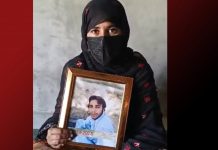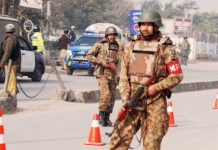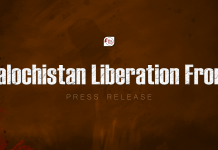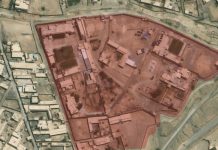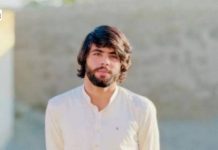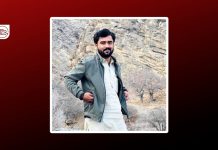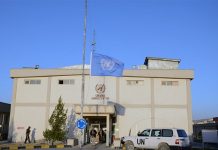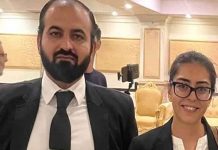After sitting in a protest camp in front of the Islamabad press club for six consecutive days, the Baloch protestors ended the camp and resorted to staging an indefinite sit-in protest on D-Chowk in Islamabad, waiting for the prime minister of Pakistan to approach and personally assure them of the recovery of their loved ones. The hundreds-strong march started from the Islamabad National Press Club and culminated at the D-Chowk as the protestors staged a sit-in protest on the junction. The Islamabad police attempted to stop the protest by force by barricading the road to the intended area. One elderly female protestor fainted the site due to exhaustion and had to be immediately rushed to an ambulance for recovery.
According to reports, the Voice for Baloch Missing Persons protest camp in the federal capital Islamabad culminated on Tuesday as the protestors marched to the D-Chowk – few hundred meters from the seat of the Pakistani government – and staged an indefinite sit-in protest. Viral videos of the march show the Islamabad police, both male and female staff, attempting to stop the march midway as the protestors fumble their way in.
Mohsin Dawar, leader of the Pashtun Tahaffuz Movement and a sitting member of the National Assembly of Pakistan, also marched with the Baloch protestors to the intended site. Anticipating the arrival, the Islamabad police had placed road blockers on the avenue, essentially blocking the way for the protestors. The protestors, most of them Baloch and Pashtun students, moved forward in the form of a human chain, opening the way for the incoming march.
Senator Jahanzaib Jamaldini of the BNP-Mengal, Farhatullah Babar from the Pakistan Peoples Party, historian and activist Ammar Ali Jan, activists from the Pashtun Tahaffuz Movement and academics from various institutes of the capital also participated in the gathering to show solidarity with the families of the Baloch missing persons.
Addressing the gathering, the families of the Baloch missing persons said that we have travelled thousands of miles to Islamabad to make our voices heard by the rulers of the country. Haseeba Qambrani, sister of the missing Hassan and Hizbullah Qambrani, said: “You might have heard of the tyranny in Bosnia and Palestine, we have witnessed such scenes in Balochistan.
“We haven’t travelled so far for recreation”, she continued, “we have come here for the recovery of our loved ones. We have no other agenda.” She said that the genocide in Balochistan began in 2001 and has not ceased since. If we are citizens of this country then we demand justice per its constitution.
Sammi Baloch, daughter of the missing Dr. Deen Mohd Baloch, said that my father had been “abducted” in 2009 while he was on duty in the hospital. She said that the rulers of the country claim that Balochistan is a backward territory – how will Balochistan progress when you “abduct” its academics, doctors and students, people who are the linchpin of the development of any society.
“I visited the commission on enforced disappearances, and they told me that my father’s case is ‘old'”, she said, as her voice cracked and tears rolled down her face.
She said that I have spent my childhood in protest camps. I must be told if my father is alive or dead. “Just tells us if he is dead – we have been waiting for his return for years. If he is dead, show us his grave; end this long, excruciating wait.”
Activist Ammar Ali Jan also addressed the gathering, saying that as a Punjabi, I believe that the inhabitants of Punjab must be ashamed of themselves for their inability to share the pain and suffering of their fellow countrymen. He said that we, the Punjabis, have always distanced ourselves from the “state-sponsored oppression” – we used to say that this is happening in a far-off place, like in Bengal or Balochistan. Then the Pashtuns were “abducted” and we remained silent. The Sindhis suffered a similar fate, and we said that Sindh is located far-away, it doesn’t affect us. We also justified the oppression of the Seraikis by saying that they might’ve been terrorists. “It is the time for us [Punjabis] to consider their pain and anguish as ours.”
“You, the Baloch”, he added, “have fought a hard battle: You have lost many sons, you have lifted countless dead bodies,” he added.
Several others also spoke before the gathering, including the mother of missing Zakir Majeed, sister of missing Shabeer Baloch and fiancé of missing Naseem Baloch. They said that we have not come to the capital to demand development in Balochistan; we want the safe recovery of our missing loved ones who have been “forcibly disappeared” by the intelligence agencies of Pakistan.
The mother and the young niece of missing Rashid Hussain also addressed the demonstration, saying that Rashid was detained in UAE by the Emirati forces and “illegally” extradited to Pakistan. The media aired the news of his arrest, yet the judiciary of the country has labelled him as a “fugitive.”
Rashid Hussain’s mother said that commission on enforced disappearances has been rubbing salt on our wounds. When I was presented before this commission, their conduct was “harsh” and “uncouth.”
Other speakers said that establishing peace in Balochistan without resolving the missing persons is a “pipe dream.” They said those aiming to settle the issue with armed means, must retrospectively reflect upon the cessation of Bengal in 1971. “Musharraf couldn’t conquer Balochistan with brute force and arms, and the rest should also give up this fancy.”
The elderly mother of the missing Jahanzaib Baloch passed out during the protest and was immediately rushed to an ambulance for convalescence.
In the frosty winter nights of Islamabad, the protestors are still sitting on the roads, surrounded by a heavy presence of the Islamabad police. They demand that the prime minister of Pakistan must personally come to assure them of the recovery of their loved ones, or else they will not call off their protest. As of so far, neither the prime minister nor any of his representatives have come to hear the protestors.











